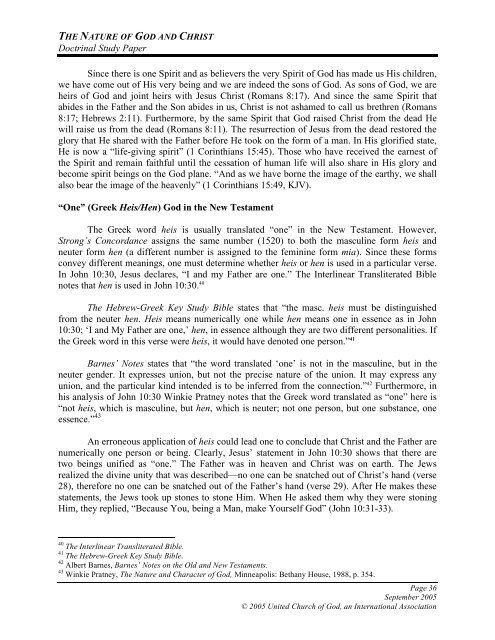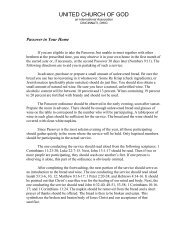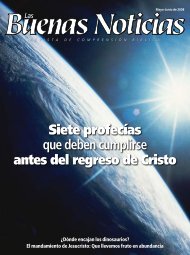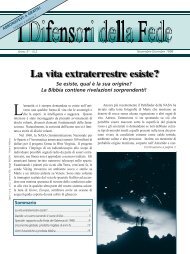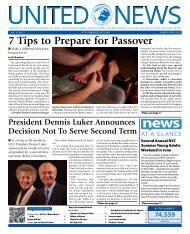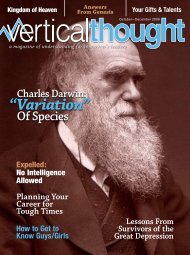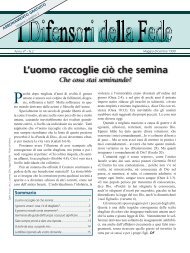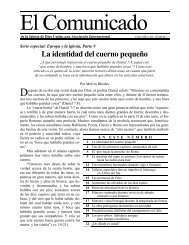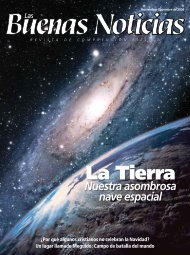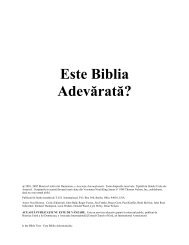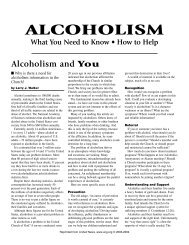The Nature of God and Christ - Members Site - United Church of God
The Nature of God and Christ - Members Site - United Church of God
The Nature of God and Christ - Members Site - United Church of God
- No tags were found...
Create successful ePaper yourself
Turn your PDF publications into a flip-book with our unique Google optimized e-Paper software.
THE NATURE OF GOD AND CHRISTDoctrinal Study PaperSince there is one Spirit <strong>and</strong> as believers the very Spirit <strong>of</strong> <strong>God</strong> has made us His children,we have come out <strong>of</strong> His very being <strong>and</strong> we are indeed the sons <strong>of</strong> <strong>God</strong>. As sons <strong>of</strong> <strong>God</strong>, we areheirs <strong>of</strong> <strong>God</strong> <strong>and</strong> joint heirs with Jesus <strong>Christ</strong> (Romans 8:17). And since the same Spirit thatabides in the Father <strong>and</strong> the Son abides in us, <strong>Christ</strong> is not ashamed to call us brethren (Romans8:17; Hebrews 2:11). Furthermore, by the same Spirit that <strong>God</strong> raised <strong>Christ</strong> from the dead Hewill raise us from the dead (Romans 8:11). <strong>The</strong> resurrection <strong>of</strong> Jesus from the dead restored theglory that He shared with the Father before He took on the form <strong>of</strong> a man. In His glorified state,He is now a “life-giving spirit” (1 Corinthians 15:45). Those who have received the earnest <strong>of</strong>the Spirit <strong>and</strong> remain faithful until the cessation <strong>of</strong> human life will also share in His glory <strong>and</strong>become spirit beings on the <strong>God</strong> plane. “And as we have borne the image <strong>of</strong> the earthy, we shallalso bear the image <strong>of</strong> the heavenly” (1 Corinthians 15:49, KJV).“One” (Greek Heis/Hen) <strong>God</strong> in the New Testament<strong>The</strong> Greek word heis is usually translated “one” in the New Testament. However,Strong’s Concordance assigns the same number (1520) to both the masculine form heis <strong>and</strong>neuter form hen (a different number is assigned to the feminine form mia). Since these formsconvey different meanings, one must determine whether heis or hen is used in a particular verse.In John 10:30, Jesus declares, “I <strong>and</strong> my Father are one.” <strong>The</strong> Interlinear Transliterated Biblenotes that hen is used in John 10:30. 40<strong>The</strong> Hebrew-Greek Key Study Bible states that “the masc. heis must be distinguishedfrom the neuter hen. Heis means numerically one while hen means one in essence as in John10:30; ‘I <strong>and</strong> My Father are one,’ hen, in essence although they are two different personalities. Ifthe Greek word in this verse were heis, it would have denoted one person.” 41Barnes’ Notes states that “the word translated ‘one’ is not in the masculine, but in theneuter gender. It expresses union, but not the precise nature <strong>of</strong> the union. It may express anyunion, <strong>and</strong> the particular kind intended is to be inferred from the connection.” 42 Furthermore, inhis analysis <strong>of</strong> John 10:30 Winkie Pratney notes that the Greek word translated as “one” here is“not heis, which is masculine, but hen, which is neuter; not one person, but one substance, oneessence.” 43An erroneous application <strong>of</strong> heis could lead one to conclude that <strong>Christ</strong> <strong>and</strong> the Father arenumerically one person or being. Clearly, Jesus’ statement in John 10:30 shows that there aretwo beings unified as “one.” <strong>The</strong> Father was in heaven <strong>and</strong> <strong>Christ</strong> was on earth. <strong>The</strong> Jewsrealized the divine unity that was described—no one can be snatched out <strong>of</strong> <strong>Christ</strong>’s h<strong>and</strong> (verse28), therefore no one can be snatched out <strong>of</strong> the Father’s h<strong>and</strong> (verse 29). After He makes thesestatements, the Jews took up stones to stone Him. When He asked them why they were stoningHim, they replied, “Because You, being a Man, make Yourself <strong>God</strong>” (John 10:31-33).40 <strong>The</strong> Interlinear Transliterated Bible.41 <strong>The</strong> Hebrew-Greek Key Study Bible.42 Albert Barnes, Barnes’ Notes on the Old <strong>and</strong> New Testaments.43 Winkie Pratney, <strong>The</strong> <strong>Nature</strong> <strong>and</strong> Character <strong>of</strong> <strong>God</strong>, Minneapolis: Bethany House, 1988, p. 354.Page 36September 2005© 2005 <strong>United</strong> <strong>Church</strong> <strong>of</strong> <strong>God</strong>, an International Association


